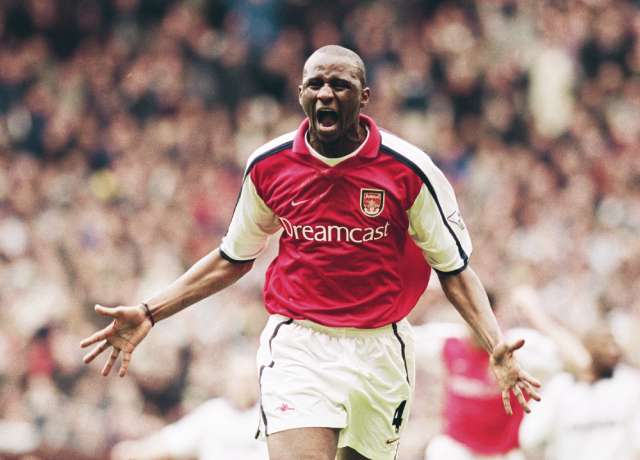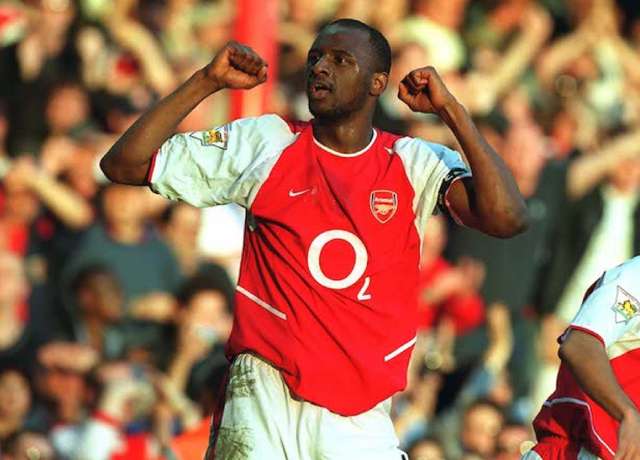This article will tell you about the career highlights of Arsenal legend Patrick Vieira
Patrick Vieira is a retired French professional football player, widely considered one of the greatest midfielders of his generation. He was born on June 23, 1976, in Dakar, Senegal, and began his football career as a youth player at the famous French club Cannes.
Vieira is widely regarded as one of the greatest midfielders of his generation, known for his physicality, technical ability, and leadership on the field.
He won numerous titles and accolades throughout his career and remains a respected figure in the football world.
Early Career
After impressing at Cannes, Vieira moved to AC Milan in 1995 but failed to establish himself in the first team, making just two appearances in his first season. He was then loaned out to French club Bastia. There he played regularly and showed his immense potential as a powerful, dynamic midfielder.
Also Read: Top 10 Greatest Defensive-Midfielders of All Time
In 1996, Vieira joined Arsenal for a fee of £3.5 million, which was a record for a teenager at the time. He quickly established himself as a key player in the team, forming a formidable midfield partnership with Emmanuel Petit.
He along with Patit helped Arsenal win the Premier League and FA Cup double in his first full season at the club.
Mid Career
Over the next few seasons, Vieira continued to be a crucial player for Arsenal. He helped them win two more Premier League titles and reach the final of the UEFA Cup in 2000. He was known for his physicality, range of passing, and ability to dominate midfield battles.
In 2005, Vieira left Arsenal to join Italian giants Juventus, where he won two Serie A titles in his first two seasons at the club. However, Juventus were later found guilty of match-fixing and were relegated to Serie B, prompting Vieira to join Inter Milan in 2006.
Late Career
Vieira spent two seasons at Inter Milan, winning another Serie A title in 2007-08. However, he struggled with injuries and saw his playing time reduced, prompting him to move to Manchester City in 2010.
Patrick played for Manchester City for one and a half seasons, serving mainly as a backup player and mentor to the younger players in the squad. He retired from professional football in 2011 having won numerous domestic and international titles. Of course he cemented his place as one of the all-time great midfielders.
In addition to his club career, Vieira was also a key player for the French national team, earning 107 caps. He also helped them win the 1998 World Cup and reach the final of the 2006 tournament.
He was known for his leadership and toughness on the field, as well as his ability to perform in big matches.
Life After Retirement
After retiring from playing, Vieira became a coach and manager, taking charge of New York City FC in the MLS and then moving to European clubs such as Nice and Crystal Palace. He is currently the head coach of the Premier League club, Crystal Palace.
Awards & Achievements
Patrick Vieira won several trophies during his illustrious career, including:
With Arsenal:
- Premier League (3): 1997-98, 2001-02, 2003-04
- FA Cup (4): 1997-98, 2001-02, 2002-03, 2004-05
- Community Shield (4): 1998, 1999, 2002, 2004
With Juventus:
- Serie A (2): 2005-06, 2006-07
With Inter Milan:
- Serie A (1): 2007-08
- Supercoppa Italiana (1): 2006
With France:
- FIFA World Cup (1): 1998
- UEFA European Championship runner-up (1): 2000
- FIFA Confederations Cup (1): 2001
In addition to these major trophies, Vieira also won several individual awards throughout his career, including the Premier League Player of the Season (2000-01), the UEFA Team of the Year (2001, 2002), and the FIFA 100 (2004), which is a list of the world’s greatest living players, as selected by Pele.


